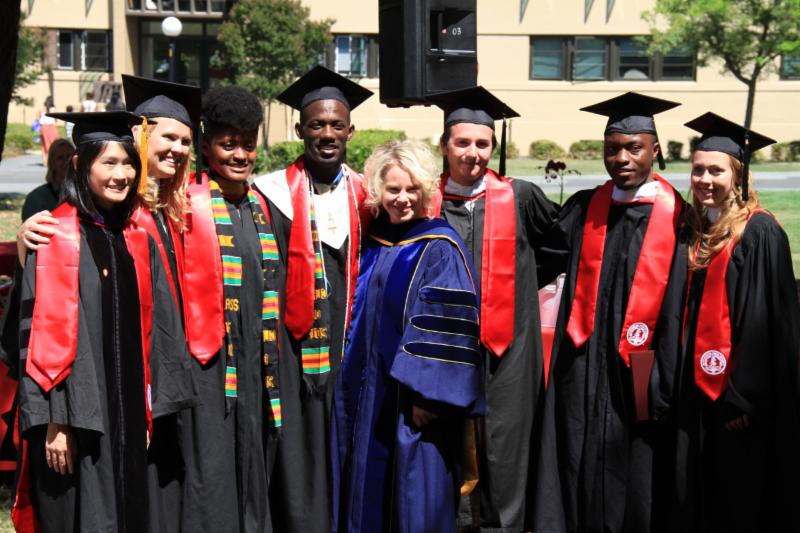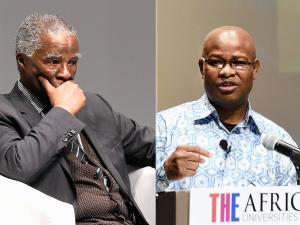|
Global Africa Diaspora Summit 2015
Cooperation Between Historical Black Colleges, African Studies Departments in the Diaspora and Colleges and Universities in Africa
Institutions of Higher Learning as Drivers in Realizing AGENDA 2063 "A Global Strategy to Optimize the use of Africa's resources for the benefits of all Africans."
And the Declaration of the Global Africa Diaspora Summit in South Africa 2012 by the African Union.
|
| * * * * * * * * October * 9 * 2015 * * * * * * * *
|
|
The Honorable Dr. Joseph Chilengi Presiding Officer African Union Economic Social and Cultural Council Engaging non-state stakeholders as partners in development and advising the AU on effective translation of the objectives, principles, and policies of the African Union into concrete programs and evaluation of the programs.
AU ECOSOCC Holds Partnership Talks with EU Counterpart
African Union Citizen and Diaspora Organizations Strengthening framework of consultation with civil society groups in the continent and consolidating the frame work for effective Diaspora contribution to the development and integration agenda of the continent.
Dr. Jinmi Adisa, Director
Related Links
AU Conferences of Intellectuals from African and the Diaspora
|
|
Dear Educators and Supporters: It is a legacy opportunity to host the first forum to implement the Declaration of the Global Africa Diaspora Summit 2012 by the African Union.
Among thought-provoking mechanisms that enable synergistic interlinking, under SOCIAL CORPORATION, the plenary discussions and interactive sessions will focus on:
Knowledge and Education
a) Design and develop platforms for African and Diaspora educators and scholars to address the developmental agenda of the Continent and the Diaspora. These would include, among others, the establishment of African- centred institutions and programmes and increased collaboration efforts between academic and research institutions in Africa and the Diaspora regions;
b) Ensure the harmonisation and implementation of regional and international protocols protecting indigenous knowledge systems and intellectual property rights;
c) Emphasize the importance of education as a basic condition of achieving human development and the need to promote literacy campaigns.
d) Support the creation of linkages between Diaspora Academic, Research and Development Institutions and those in Africa;
e) Ensure the participation of Diaspora Experts in the development and implementation of AU-Diaspora initiative.
For the full text of the AU Declaration of the Global Africa Summit 2012, the overview of the 2015 Summit, and other articles: Read Get the insights, engage in the lively discussions, experience the invigorating networking, make the connections with Africa for partnership and broadened internationalism.
Join the Co-chair Barbara A. Simmons, JD Inaugural Dean, Associate Professor, International Education, William V.S. Tubman University.
A Diaspora Resident. |
 |
| This program is free and committed to the leverage scholarship and leadership cooperation for mutual developments. |
 |
 |
| Historical Black Colleges and Universities (HBCU) in the US
The Higher Education Act of 1965, as amended, defines an HBCU as: " any historically black college or university that was established prior to 1964, whose principal mission was, and is, the education of black Americans, and that is accredited by a nationally recognized accrediting agency or association determined by the Secretary of Education to be a reliable authority as to the quality of training offered or is, according to such an agency or association, making reasonable progress toward accreditation."
While the 105 HBCUs represent only 3% of the US institutions of higher learning, t he graduate nearly 20% of African Americans who earn undergraduate degrees.
Mindful of their unique sensibility to the education and needs of young African Americans, HBCUs remain the institutions that demonstrate the most effective ability to graduate African American students who are poised to be competitive in the corporate, research, academic, governmental and military arenas.
- HBCUs generate 25 percent of all bachelor's degrees in STEM fields earned by African Americans;
- Awarded 14 percent of all African American engineering degrees;
- Four-Year HBCUs produce graduates at less than half the cost of other four-year colleges and universities
While addressing the education of African Americans, HBCUs offer all students, regardless of race, an opportunity to develop their skills and talents. These institutions train young people who go on to serve domestically and internationally in the professions as entrepreneurs and in the public and private sectors.
Credited: African Studies Department - Stanford University
African Studies Departments are centered on interdisciplinary study of Africa with teaching, research, and outreach activities that promote greater understanding and appreciation of the continent and its people, including through the study of Africa in global perspective by cooperating with other area-studies, programs, international centers, professional schools, and departments within and beyond the school.
Outreach to historical black colleges and African Studies Department in the Diaspora would include Canada, Europe, South America, Asia, Middle East and Australia to build and strengthen collaboration, including student exchange, with African colleges and universities.
|
|
|
|
| Join the African Union's Vows to End the Marriage: The Place of the African Girl Child is in the classroom.
T here is good news. The enrollment of the African Girl Child is rising. In fact, in many places, girls are running away with the big academic prizes. Africa still holds the lead in the world with Rwanda having the largest percentage of women in parliament. You educate the woman, you educate the state and continent. So yes, Africa is rising for all. | | | Angelique Kodjo: A Campaign by Africans for Africa to Stop Child Marriage in Africa |
But we have a critical issue to tackle. The African Union (AU) is facing it with a n Africa-wide movement of leaders and organizations collectively saying 'No to Child Marriage,'" said Martin Mogwanja, Deputy Executive Director of UNICEF. "This push led by Africans for Africans must not stop until every girl in every family and every community has the right to reach her 18th birthday before getting married."
In July 2015, the United Nations Human Rights Council adopted a resolution calling for an end to child, early and forced marriage. The Council said the practice is a barrier to sustainable development which perpetuates poverty, throwing its support behind the U.N. Sustainable Development Goal of eliminating child marriage and female genital mutilation. Child brides are not physically or emotionally prepared to become wives, neither can they give consent while often being dependent on their husbands and deprived of their fundamental rights to education, health, and safety.
In May 2014, the AU launched a two-year continental campaign to end child marriage in Africa during the 4th session of AU Conference of Ministers of Social development and in partnership with the UN Children's Fund, the UN Population Fund (UNFPA), and other partners. At the launch of the campaign, the AU indicated that girls continue to be married as children in Africa, with more than five and a half million women who are today in their early 20s married before they reached their 15th birthday.
Convened under the theme " Strengthening the African family for inclusive development in Africa," the conferees deliberated on issues related to family-oriented policies and instruments towards improving family-wellbeing on the continent. A statement from the AU quoted H.E. Nkosazana Dlamini-Zuma, Chairperson of AU Commission as saying, "We cannot down play or neglect the harmful practice of child marriage as it has long term and devastating effects on these girls whose health is at risk and at worst leading to death due to child birth and other complications."
The child brides are at greater risk of experiencing dangerous complications in pregnancy and childbirth resulting in high rates in maternal and child mortality, obstetric fistula, premature births, sexually transmitted diseases (including cervical cancer), and HIV, and domestic violence, said African Union. With little access to education and economic opportunities, they and their families are more likely to live in a cycle of poverty Based on recent research, the estimated economic gain from achieving universal primary education exceeds the estimated increase in public spending required to achieve it. One extra year of schooling can increase an individual's earnings by 10%. Girls who complete a primary education are likely to increase their earnings by 5 to 15% over their lifetimes. Each additional year of schooling could raise average annual gross domestic product growth by 0.37%. If all women had a primary education, child marriages and child mortality could fall by a sixth, and maternal deaths by two-thirds. Investing in our girls' education could boost Africa's agricultural output by up to 25%. Some countries lose more than $1 billion a year by failing to educate girls to the same level as boys. Without education and citizens taking part in growing their economy and reaping the benefits, we cannot build the Africa We Want for the Future. | | | The Africa We Want For the Future |
AU Stepping It Up
"Child molesters, pedophiles, and rapists should not be allowed to get away with lenient sentences such as community service. Child marriage is a tragedy for the girl child, her unborn children and her country's development." 
On July 31, 2015, at the Harare International Conference Centre, under the banner of "We are Girls Not Brides," Zimbabwe launched the AU vow to end child marriage. Speaking at the launch, Dr. Mustapha Sidiki Kaloko, the AU Commissioner for Social Affairs noted that the launch of the AU Campaign to End Child Marriage in Zimbabwe comes at a time when H.E. Cde Robert Mugabe is the sitting Chairperson of the African Union and highlighted H.E. Mugabe's commitment not just to the theme of the African Union for 2015, the Year of Women Empowerment and Development towards Agenda 2063, but also issues affecting women and girls across the continent.
H. E. Mugabe was able to galvanize other Heads of States into adopting the African Common Position on Ending Child Marriage during the June 2015 Assembly of AU Heads of State and Government. Zimbabwe is the 8th African Union state to launch the AU Campaign following Ethiopia, Niger, Burkina Faso, Chad, Democratic Republic of Congo, Madagascar and Uganda.
Ms. Nyaradzayi Gumbonzvanda, the AU Goodwill Ambassador on Ending Child Marriage in Africa said " we have a crisis on our hands. The UN estimates that 15 million girls experience child marriage each year. That is more than the entire population of Zimbabwe. We must move from vulnerability to voice and leadership. Africa is young and full of innovation. This energy must be harnessed to ensure that we have lasting solutions."
"We are excited by the launch of the campaign because it is very progressive," said Beatrice Savadye, Director of Real Open Opportunities for Transformation Support. AU COURSE ON ENDING CHILD MARRIAGE AND HARMFUL TRADITIONAL PRACTICES IN AFRICA- MECHANISMS AND STRATEGIES Diaspora lend your voice and hand in support African Union's vow to end child marriage.
Related link: African Committee of Experts on the Rights and Welfare of the Child.
|
|
The African Union is pleased to announce the call for the submission of project proposals under Theme No. 4 of the African Women's Decade: "Education, Science and Technology."
Deadline: September 15, 2015
|
Thabo Mbeki on the future of African universities at the Africa Universities Summit on July 30-31, 2015 at the University of Johannesburg, South Africa. Dedicated to academic leaders within and beyond Africa, the lively sessions included rethinking that addressed funding Africa's renewal, partnership and university collaboration, as well as science, technology and innovation.
The former president concluded: " Perhaps the recognition of the need for an African knowledge society to achieve the Africa we want by 2063 is exactly the message we need to signal the commitment of our political leadership to provide the resources which will enable the African university to play its role, firmly situated at the centre of the Agenda 2063 development vision. Time will tell how well the African state and the African university respond to the shared challenges they face!" |
| Former president Thabo Mbeki, left, and Professor Adebayo Olukoshi, director of the African Institute for Economic Development and Planning, at the opening of the Times Higher Education Africa Universities Summit at the University of Johannesburg. Photos: Nokuthula Mbatha
Varsities must lead education rethink' By Tebogo Monama
Johannesburg - There might be a need to rethink the entire education system to ensure pupils who leave secondary schools are better prepared for higher education.
From left: Profs. Bayo Olukoshi; Bolaji Aluko, Vice Chancellor, Federal University of Otuoke, Nigeria; and Pius Adesanmi at the THE African Universities Summit in Johannesburg, on July 31, 2015 (courtesy Prof. Aluko) .
Paraphrasing Prof. Olukoshi: " African universities cannot afford to be non-chalant observers, or un-charitable critics of governments....on Africa Agenda 2063. they must strive to be at the center of the Agenda, to drive it.." Prof. Aluko.
According to African Institute for Economic Development and Planning director Professor Adebayo Olukoshi, universities across Africa often complain that the students they get from high schools aren't ready for tertiary education.
Olukoshi said universities needed to lead the conversation on the continent rethinking the entire education system.
"Many universities are failed by secondary and primary education systems that are completely out of sync with the kind of students the professors expect. Too many universities complain... that the products of our secondary and primary educational systems do not have the necessary preparations to enable them to have a useful academic time.
"The necessary conversation that must take place about how to revitalise and create a coherent national educational system has been lacking. Universities can play an important role in this conversation," Olukoshi said. He was speaking at the Times Higher Education Africa Universities Summit that started at the University of Johannesburg on July 30-31, 2015.
Olukoshi said because of the complaints, public primary and secondary schools were fast being replaced by private schools. He said the same trend was spreading to universities, with more private higher education institutions opening up.
He said that to build better higher education institutions in Africa, collaboration among institutions was important.
"Breaking down barriers, including sometimes purely egotistic barriers, for collaboration within countries - among universities - and beyond countries among African universities is important. Hardly any university on our continent is able to claim to have all the qualified faculty it requires to compete globally.
"Thinking of ways to break down barriers that will enable us to develop faculties for the joint benefit and mobility between universities' boundaries is an important part of the challenge," Olukoshi said.
Former president Thabo Mbeki, who opened the summit, said governments needed to relook at the funding of higher education institutions. He said that after independence, most African countries viewed universities with pride as they might have helped to attain liberation.
"There is fairly extensive literature about how the then healthy relationship between the state and the university was weakened and destroyed."
"In many instances, if not most, this was linked to the introduction of structural adjustment programmes by the Bretton Woods institutions and the perception among the African ruling elite that the universities were serving as centres of political opposition to this elite," Mbeki said.
From this straining of relations, governments started "seeing expenditure on universities and therefore higher education as a burdensome but unavoidable cost rather than an absolutely necessary and beneficial investment".
He said universities now had a tough task to convince governments that they were indeed interested in the African development agenda and, therefore, needed better investments to further this.
"It is only once they are convinced about all this that it would be possible for our governments to lead the process, which would result in the substantially larger public funding that is required and without which many of the radical changes that need to be made will not see the light of day." |
|
|
|










I found your blog very much helpful for myself and thanks a lot for sharing. If you are looking for the right platform to know about Startup Funding Africa, then choose WeeTracker.
ReplyDelete